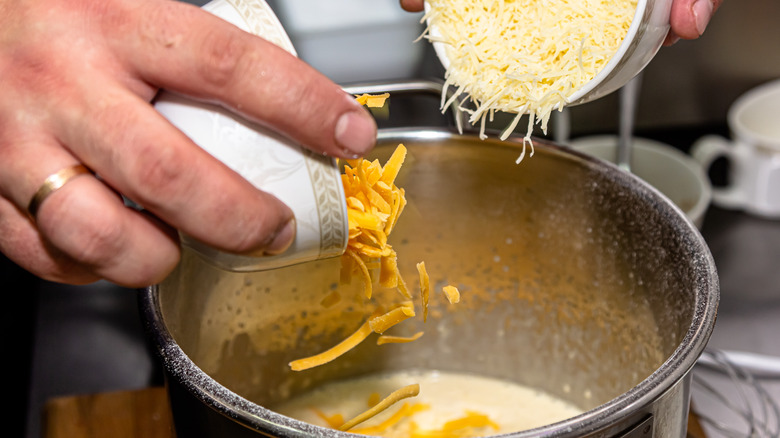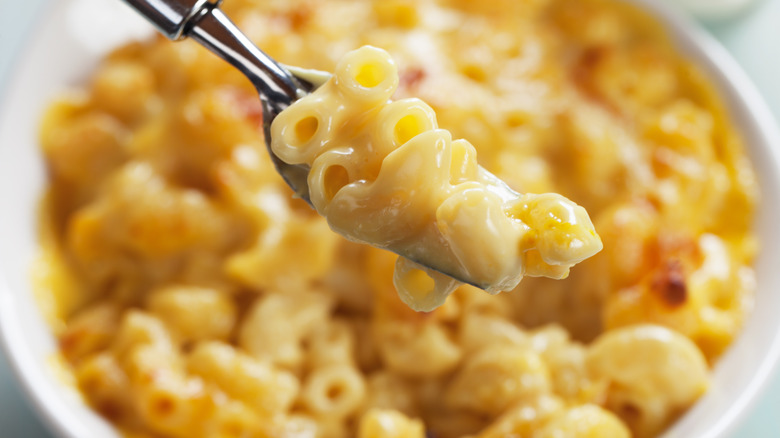Samin Nosrat Has An Antidote For Your Homemade Cheese Sauce Nightmares
Samin Nosrat has made her mark on countless kitchens by explaining the science behind food in ways that any home cook can understand. Her seminal book, "Salt, Fat, Acid, Heat," and the Netflix series it spawned introduced many of us to a different way of approaching the kitchen, one that relies on intuition rather than strict measurements. As she told NPR upon the book's release, she was motivated by the perception that "recipes don't encourage you to use your own senses and use your own judgment." Our five senses — taste, touch, smell, sight, and even sound — are the only real way to evaluate food. No matter how closely you follow a recipe's directions, your senses will always be the one true judge of success, which brings us to mac and cheese.
On her "Home Cooking" podcast, Nosrat and co-host Hrishikesh Hirway dove into the beloved comfort food, which is usually made by bathing noodles in a béchamel sauce with cheese. This is technically known as mornay sauce, and it may be the best example of what Nosrat told NPR. Even if you follow a recipe for cheese sauce to the letter, you'll often end up with an oily, grainy mess that violates the senses. Both podcast hosts bemoaned this fact, but Nosrat brought up a unique solution to the problem: sodium citrate. For the unfamiliar, this chemical can sound intimidating, but once you understand the science behind it, your cheese sauce nightmares will come to an end.
Why your cheese sauce curdles
Cheese sauce has such potential. Just thinking about this glorious goo is enough to make your mouth water and your eyes fill with tears of joy. Unfortunately, cheese sauces have a tendency to curdle, the oils and solids separating to form a greasy and grainy disaster. Cook's Illustrated explains the science behind this, noting that cheese is mostly composed of fat and water, which are held together by a network of proteins. The proteins in turn are bound by calcium, forming a mesh that keeps all the elements of cheese together. When cheese meets heat, the fat liquifies and starts to ooze. For the cheese to melt smoothly, the protein network must be able to stretch along with the liquid, keeping the fat and water together.
Unfortunately, this doesn't happen in aged cheeses like sharp cheddar or Gruyère cheese. That's because the aging process causes much of the water in cheese to evaporate while the proteins tightly clump together. In one sense, this is good because it concentrates the flavor of the cheese, making it more intense. However, when you melt these cheeses, the tight protein network cannot expand with the liquified fat, causing the grease to separate while the protein forms grainy clusters. This is particularly frustrating because many of the most flavorful cheeses are susceptible to this problem, making it difficult to achieve a cheese sauce that is both smooth and delicious. That's where sodium citrate can help (per The Cheese Professor).
How sodium citrate works
Sodium citrate is a white powder composed of sodium and citric acid (via PubChem). While its chemical name may be off-putting to some, Healthline notes that citric acid naturally occurs in citrus, berries, tomatoes, and a host of other produce. It is a very common additive to food, often used to make processed American cheese. Sodium citrate helps us get around that old adage that oil and water don't mix. According to Cook's Illustrated, sodium citrate plays a similar role to the calcium ions that hold cheese's natural protein network together. This prevents the protein mesh from breaking apart in the melting process, holding the fat and water within the cheese together to stop them from separating.
On the "Home Cooking" podcast, Samin Nosrat explains that you can buy sodium citrate itself and use it to create a cheese sauce with the melty power of American cheese but the flavor of something fancier. She says, "you can make essentially your own homemade Velveeta or your own homemade nacho cheese out of any quality cheese that you want, using the highest quality cheddar, whatever delicious quality, amazing cheeses that you buy at the store." To do so, you only need to dissolve a pinch of sodium citrate in a small amount of hot water, then stir in the cheese of your choice and watch it transform into a velvety sauce perfect for mac and cheese, nachos, or shoving spoonfuls in your mouth when nobody's watching.


